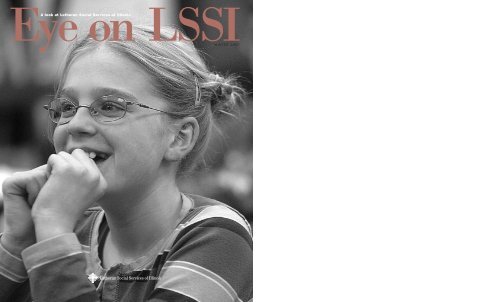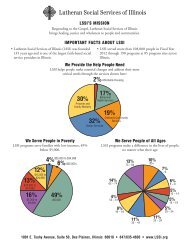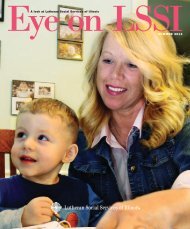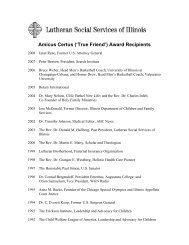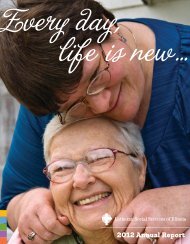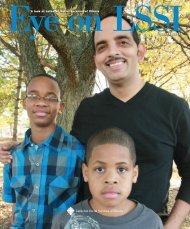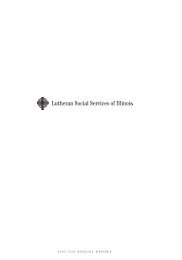Download PDF of entire publication - Lutheran Social Services of ...
Download PDF of entire publication - Lutheran Social Services of ...
Download PDF of entire publication - Lutheran Social Services of ...
You also want an ePaper? Increase the reach of your titles
YUMPU automatically turns print PDFs into web optimized ePapers that Google loves.
Eye on LSSIA look at <strong>Lutheran</strong> <strong>Social</strong> <strong>Services</strong> <strong>of</strong> IllinoisWINTER 2007
<strong>Lutheran</strong> <strong>Social</strong> <strong>Services</strong> <strong>of</strong>Illinois is the statewide socialservice agency <strong>of</strong> the Illinoissynods <strong>of</strong> the Evangelical<strong>Lutheran</strong> Church in America.Frederick Aigner, PastorPresident• • • •Managing Editor andPhotographerJo Ann DollardArt DirectorPam MaremontContributing WritersJo Ann Dollard, Terri Gens,Nicole Niemi, Judy Schmidt,Dan Schwick and Carol VanderMey• • • •MISSION STA TEMENTResponding to the Gospel,<strong>Lutheran</strong> <strong>Social</strong> <strong>Services</strong> <strong>of</strong> Illinoisbrings healing, justice and wholenessto people and communities.VISION STA TEMENT<strong>Lutheran</strong> <strong>Social</strong> <strong>Services</strong> <strong>of</strong> Illinois,as one agency with many expressions,will create community by graciouslyserving as both the employer andprovider <strong>of</strong> choice.www.LSSI.orgON THE COVER…Taylor, a fifth-grade student atRiverdale School in Rock Falls,enjoys learning aboutcharacter development in aclassroom presentation <strong>of</strong>feredthrough LSSI’s School-Based<strong>Services</strong>. Photo by Alex Paschal<strong>Lutheran</strong> <strong>Social</strong> <strong>Services</strong> <strong>of</strong> Illinois does notdiscriminate in admission to programs oremployment in compliance with the law.Eye on LSSIWinter 2007 • Volume 21, Number 12Out <strong>of</strong> the Basement and Into the BallroomThe Women’s Network, founded 25 years ago, has grown tobe a group <strong>of</strong> more than 80 women who pool their collectiveskills and enthusiasm to make a difference in the lives <strong>of</strong>the people served by the agency.6A Positive Influence, Day By DayLSSI’s School-Based Program, <strong>of</strong>fered at 15 public schoolsin north central Illinois, provides a variety <strong>of</strong> educationand support services to students, freeing them to focustheir energy on schoolwork.10In the Comfort <strong>of</strong> HomeIntouch <strong>Services</strong> in Peoria, which just celebrated its 25 thanniversary, makes home care services affordable,enabling seniors to stay in their homes.14Detox Opens the Door to Getting SoberSometimes the first opportunity to engage people intreatment, LSSI’s Detox program brings hope to thosestruggling with alcoholism and other drug addictions.18Parents: The Hands <strong>of</strong> Head StartAt LSSI’s six Head Start sites in Chicago, parent volunteershelp out, providing invaluable support to teachers and staffand enriching students’ Head Start experience.From My Perspective . . . . . . . . . . . . . . . . . . . . . . . . . . . . . . . . 1Advocacy Agenda . . . . . . . . . . . . . . . . . . . . . . . . . . . . . . . . . . . 13The Big Picture . . . . . . . . . . . . . . . . . . . . . . . . . . . . . . . . . . . . . 20Our People, Our Strength . . . . . . . . . . . . . . . . . . . . . . . . . . . . 22LLOYD DEGRANEAfter you’ve been aroundnearly 140 years — our agency’sanniversary is on October 31this year — how do you keepyour vision clear, your energyreplenished? You might becomesomewhat bleary-eyed and tiredon a journey like this, epic inboth its length and its scope.Institutional renewal comes as a gift, usually impartedthrough new people who come to an organization, orthrough a new spirit that develops in people who’ve beenwith an organization for a period <strong>of</strong> time. What also freesour energy as a social ministry organization is not just tohope, but to take steps. Renewal comes from broadvisions channeled into specific, concrete plans.For LSSI, growth has always come when need, resourcesand staff — the right people to administer and directly meetthose needs — come together. LSSI’s affordable housing forseniors and people with disabilities reflects one clearexample <strong>of</strong> when need, funding and staffing converge.About six months ago, LSSI opened Victorian Woods — abeautiful, 59-unit building in Decatur funded by HUD (U.S.Department <strong>of</strong> Housing and Urban Development). In thenext two years, LSSI will open three additionaldevelopments, in Rockford, Danville and Taylorville.Whether you’re an individual or an organization, youfeel better when you’re growing. In the fall <strong>of</strong> 2005, ourBoard <strong>of</strong> Directors developed a “Strategic Plan” — anotherway <strong>of</strong> saying how we as an agency and institution plan toserve and grow during the next several years. I’m fairlycertain there wasn’t a strategic plan 140 years ago when ouragency was founded as an orphanage in Andover — but theelements needed for starting a social ministry were definitelythere — a need (a home for children who’d lost their parentsdue to a cholera epidemic), a way to pay for the need (thecharity <strong>of</strong> people <strong>of</strong> faith) and people committed to providingthe service (also people <strong>of</strong> faith).Our agency’s mission is to care well for the people <strong>of</strong>the state <strong>of</strong> Illinois. Our strategic plan is how we care wellfor our agency as we care for those people. I call this plan“the details <strong>of</strong> creating shalom” — a road map for findingthe future <strong>of</strong> goodness and hope that God wants us tohave mentioned in Jeremiah 29:11.As we move toward the celebration <strong>of</strong> our 140th birthdayfrom my perspective“For I know the plans I have for you,” says the Lord, “They areplans for good and not for evil, to give you a future and a hope.”— which is really about celebrating all the people we’veserved and those who have served them — how will wechoose what roads to take, where to venture, how to grow?First, we choose how to serve in terms <strong>of</strong> what is in thebest interest <strong>of</strong> our future clients. Part <strong>of</strong> that is continuallyassessing how we can best use the resources we have —how we will serve and how we will not serve. Second, wehave or will open programs in areas <strong>of</strong> service where wealready serve, such as in 2005 when we opened a thirdgroup home for adults with Prader-Willi syndrome. Third,we have and will assess both needs and gaps in servicesand find funding, both from the government and fromcontributors, to resource those needs.Even with a sound strategic plan, for LSSI, growing —serving more people in new ways or new places — isn’t asimple act <strong>of</strong> will. It is more like a complex dance. Ouragency has many partners in both the government (e.g., theIllinois Department <strong>of</strong> Children and Family <strong>Services</strong>, theDivision <strong>of</strong> Alcoholism and Substance Abuse, et al.) and inthe church. Our growth as an agency is orchestratedthrough these partnerships and is dependent on our abilityto dance well and carefully together. And without thesepartners, there can be no dance.In our strategic plan, we’ve outlined several areas wherewe plan to grow. Two have already been mentioned. We alsowant to serve more children in need <strong>of</strong> specialized fostercare services. Serving more women through our Prisonerand Family Ministry’s Connections program — those whoare incarcerated as well as those who have been releasedand need support to build new lives after leaving prison —is also part <strong>of</strong> our plan.Finally, our steps on this journey toward finding thefullness <strong>of</strong> shalom in our organization’s life, ultimately, afuture <strong>of</strong> hope and good for the people <strong>of</strong> Illinois — dependnot only on our careful efforts, strategies and partnerships.These are all important in creating the reality we desire, butultimately, it is a gift <strong>of</strong> the spirit that leads us toward thefulfillment <strong>of</strong> God’s vision — good for all God’s people.Blessings in your Lenten journey,Frederick Aigner, PastorPresident, LSSIJEREMIAH 29:11An agency <strong>of</strong>the United WayWinter 2007 • Eye on LSSI • • • 1
AH, THE LUTHERAN POTLUCK. The meatballs, those JELL-O © gelatin molds, the madefrom-scratchdesserts served with c<strong>of</strong>fee from an industrial-sized, stainless steel pot. Wherever<strong>Lutheran</strong>s gather, there’s always food. And, typically, they gather in the church basement forcircle meetings, quilting groups, Bible study or church council meetings.THE WOMEN’S NETWORK:Out <strong>of</strong> the Basementand Into the BallroomBut Jody Hedberg had other ideas. Encouraged by BillCarlson, a consultant, “We wanted to get the <strong>Lutheran</strong>s out<strong>of</strong> the church basement and into the ballroom,” she says.Hedberg got her wish. In 1982, <strong>Lutheran</strong> <strong>Social</strong> <strong>Services</strong> <strong>of</strong>Illinois (LSSI) held its first Amicus Certus (“True Friend”)dinner at the Ritz-Carleton in Chicago. The dinner, whichbecame an annual event, honors an individual or organizationthat has made significant contributions to humankind.Hedberg, who was tapped to organize that first event,knew that a group <strong>of</strong> volunteers would have to bemobilized for the event to continue. Thus, the Women’sNetwork <strong>of</strong> LSSI was born to support and strengthenLSSI’s mission <strong>of</strong> bringing healing, justice and wholenessto people and communities throughout the state.In its early years, the Women’s Network grew by attractingmembers through word-<strong>of</strong>-mouth. Hedberg also called onpastors <strong>of</strong> local <strong>Lutheran</strong> congregations for the names <strong>of</strong>women who might want to participate.The Women’s Network grew, and today more than 80women from metropolitan Chicago and other communitiespool their collective skills and enthusiasm to serve LSSI andmake a difference in the lives <strong>of</strong> the people whom LSSIserves. The Network supports and strengthens the mission<strong>of</strong> LSSI through education, fundraising and advocacy. Inaddition, a new chapter was formed in Springfield in 2004.Currently, the Women’s Network organizes and supportstwo major events in Metro Chicago annually: the AmicusCertus Award Dinner in the fall and the Spring Fashion Show.Over the past 25 years, the combined result <strong>of</strong> these twoevents has raised more than $2 million for LSSI programs.Bev Moody, a Women’s Network member, works on a fleece blanket forone <strong>of</strong> LSSI’s Head Start sites during a recent meeting. “I’m so inspiredby these women and I have so much fun [working with them],” she says.JO ANN DOLLARDCurrent <strong>of</strong>ficers <strong>of</strong> the Women’s Network (from left): Pr. Vivian Becker, first vice president; Torie Arth<strong>of</strong>er, president; Jan Leverenz, treasurer; MarthaGermano, secretary; and Norma Doering, second vice president.Lifting up LSSIAlmost 15 years ago, a friend <strong>of</strong> Naperville residentTorie Arth<strong>of</strong>er invited her to attend the Women’s NetworkFashion Show in Oak Brook. Now, Arth<strong>of</strong>er is president.She says that the Network is involved in two mainfunctions: continuing to run fundraising events to supportLSSI and its programs, and expanding its membership byrecruiting members <strong>of</strong> all ages and from morecongregations throughout the state. In addition, theWomen’s Network wants to educate people about LSSI.“LSSI is <strong>of</strong>ten a well-kept secret, even among <strong>Lutheran</strong>congregations,” Arth<strong>of</strong>er says. “LSSI is a vital andimportant social service agency, and we need to lift it up,celebrate it and make sure that more and more peoplebecome aware <strong>of</strong> it. So, [one <strong>of</strong> our goals] is to also bringthe message and the mission [<strong>of</strong> LSSI] to congregationsand to help garner support for all its events and programs.”Mary Satter, a long-time Women’s Network member,says she has seen a lot <strong>of</strong> changes in her 25-plus years <strong>of</strong>participation.“We recognize [that people have at] various stages in[their] lives, different demands on their time,” she says. So,while it’s time-consuming to plan a fundraising event —and not everyone can devote the time to do so — peoplecan contribute or participate in other ways, whether it’smaking a financial contribution, attending events or evenjust talking about LSSI at church.“It’s wonderful to see these women embrace each otherand our cause,” says the Rev. Dr. Frederick Aigner, LSSIpresident. “They are such a great group and are reallydoing it for the right reason. They know that because <strong>of</strong>[their efforts] someone will live a better life.”Feeling a connection to the needReading about LSSI’s programs or hearing about itsspecific needs is helpful, but one-on-one contact with theJO ANN DOLLARD2 • • • Eye on LSSI • Winter 2007Winter 2007 • Eye on LSSI • • • 3
people served by the agency is what is most inspiring. So,Women’s Network members regularly visit some <strong>of</strong> LSSI’sfacilities and programs.“Site visits afford us the opportunity to see the peoplewhom our work and funds directly benefit,” says LynnHughes, a Women’s Network member since 1982. “Meetingthe staff and feeling a connection [with a program] isworth a million words and pictures.”During site visits, Network members <strong>of</strong>ten meet withstaff members or observe programs in order to gain amore complete understanding <strong>of</strong> LSSI’s many services.Arth<strong>of</strong>er says that she would like to increase the number<strong>of</strong> site visit possibilities for Network members. “Site visits[make] a much greater impact [on members],” she says.Satter agrees. She says that it helps to see where themoney is put to use, especially because LSSI’s programsaddress important social needs.Another way the Women’s Network has been able topersonally be involved with helping some <strong>of</strong> LSSI’s programparticipants is through The Depot, a year-round volunteerproject that solicits gifts-in-kind from churches, organizationsand individuals, and then distributes them to children, youthand adults served by LSSI programs. Some <strong>of</strong> the itemsdistributed include fleece blankets, clothing, toys and books.The Depot gives the women hands-on opportunities to serveothers while enjoying friendships with each other.The ‘main events’The Women’s Network supports LSSI in a variety <strong>of</strong> ways,but its most significant efforts are hosting the AmicusCertus Award Dinner and the Spring Fashion Show.Each year, LSSI chooses a person or organization toreceive the Amicus Certus Award. Past honorees include:former U.S. Illinois Senator Paul Simon; Anne M. Burke,Chicago Special Olympics founder; The Retirement ResearchFoundation; and Rotary International. The dinner is typicallyheld at an elegant Chicago hotel, where attendees enjoy adelicious meal and an evening <strong>of</strong> dancing. A silent auction isalso held to raise additional funds for an LSSI program. In thepast, event beneficiaries have included nursing care forseniors, substance abuse treatment centers, programs foradults with developmental disabilities, services for prisonersand their families, and mental health programs.Last year, Amicus Certus celebrated its 25th anniversary andraised $213,000 for Steps to Life and Project H.O.P.E., two LSSIprograms that help foster care and other youths make thetransition to adulthood. Bruce Weber and Homer Drew,basketball coaches at the University <strong>of</strong> Illinois and ValparaisoUniversity, were the honorees (see page 20).“The dinner is so much fun,” says Hedberg. “It’s a lot <strong>of</strong>work, too, but we always had such a wonderful time, whichwas an added bonus because we knew the effort wouldbenefit so many people.”Women’s Network Bolsters Literacy by Supporting ‘Bonding with Books’For the past two years, proceeds generated (in MetroChicago) by the Women’s Network Fashion Show havesupported the Bonding with Books program, whichprovides books for the children at six Head Start sites inChicago run by <strong>Lutheran</strong> <strong>Social</strong> <strong>Services</strong> <strong>of</strong> Illinois (LSSI).Through this program, approximately 285 students receiveone book per month during the school year.The book is first readin the classroom by the teacher and then sent home with eachstudent. It’s expected that the child’s parents or caregiver willread the book with the child several times during the month.In addition, field trips and other activities reinforce the subject<strong>of</strong> the books, such as a trip to a food market during a monthwhen the book is about vegetables.The program facilitates reading at home and also helps eachstudent to build a library at home.Carol Endemann, associate executive director <strong>of</strong> Children’sCommunity <strong>Services</strong>, oversees LSSI’s Head Start program andhas been instrumental in developing Bonding with Books.Endemann says the books were specifically chosen so thatthey will continue to teach lessons once the children have readthem.The students may read about fire-fighters and then learnabout fire safety, or read about animals and learn about theirwinter hibernation habits.“The Women’s Network has been a long-time supporter <strong>of</strong>LSSI’s Head Start programs,” says Endemann. “Through theirgenerosity, we have been given the opportunity to promote andsupport family literacy.”“All <strong>of</strong> our families are at or below poverty level,” Endemannadds, “so it is always a struggle for them to provide toys,let alone books. Last school year, we were able to give eightincredibly beautiful and captivating books to every child at all <strong>of</strong>our Head Start sites — an important step towards encouragingchildren to develop a love for books.”“We’ve seen documented outcomes with kids’ test scoresreally zooming up after having more exposure to books,” she says,explaining that LSSI’s students exceeded the Head Start nationalaverage scores following their first and second years in HeadStart, with average scores ranging 5-10 percentage points abovethe national average.“It is hard to predict the future,” Endemann adds, “but ourbelief is that the Bonding with Books program will positivelyimpact each child’s chances for school success.”In the spring, the Women’s Networkorganizes its annual Luncheon andFashion Show, which is typically held theSaturday before Mother’s Day in aChicago suburb.“This is something that has reallycaught on,” says Arth<strong>of</strong>er. “It started by[only] being promoted among womenat ELCA [Evangelical <strong>Lutheran</strong> Churchin America] churches, but attendancehas really grown [to include otherguests] through word <strong>of</strong> mouth.” Shenotes that many who attend, year afteryear, have made it part <strong>of</strong> celebratingMother’s Day.And the event has grown, too, fromjust a fashion show to a larger event thatfeatures booths with crafts, jewelry andother items in a boutique atmosphere,allowing guests to view clothes andpurchase accessories. A percentage <strong>of</strong>booth sales is donated to LSSI.Bev Moody, long-time Women’sNetwork member, says she’s moved bythe generosity and cooperation <strong>of</strong> thewomen in planning this year’s FashionShow. “I’m so inspired by these women— and I have so much fun [workingwith them],” she says.Moody notes that in 2003, the showwas centered on the theme “love bearsall things,” taken from a verse in I Corinthians. As part <strong>of</strong> thatyear’s event, 1,000 teddy bears were donated for the childrenin LSSI programs, and members <strong>of</strong> the Network decided todress up the bears and use them as decorations before thebears went to their permanent homes. Moody, an artist, drewan illustration that was included in the silent auction.Branching outIn 2005, members <strong>of</strong> the Springfield Women’s Networkchapter joined with other women from local <strong>Lutheran</strong>churches to form a committee organized to host “SharingHope,” a luncheon, fashion show and silent auction. Theevents in 2005 and 2006 raised more than $21,000 to benefitLSSI programs in central Illinois, including Prisoner andFamily Ministry’s Building Homes: Rebuilding Lives andStorybook Project, as well as its foster care and adoptionprograms.“Sharing Hope” will be held again this year at St. John’s<strong>Lutheran</strong> Church in Springfield, on March 24. This yearevent is focused on how LSSI helps individuals createIn 1984, founding members <strong>of</strong> the Women’s Network, (standing, from left) Lynn Hughes, NancyMitchell, Marilyn Goll and Jody Hedberg (seated) with Dorothy Goos, LSSI’s vice president <strong>of</strong>Program <strong>Services</strong>. Hedberg served as the chairperson <strong>of</strong> the first Amicus Certus Award Dinner. “Theidea <strong>of</strong> Amicus Certus was to lift the image <strong>of</strong> the agency,” says Hedberg. “I feel the event has comeso far in the 25 years, and the Women’s Network is grateful to its members, sponsors and supporters.”homes <strong>of</strong> their own, whether at Victorian Woods, a newLSSI senior housing program in Decatur, or WashingtonPlace in Beardstown, a group home for adults withPrader-Willi syndrome.For information on the Women’s Network, contact EdNewton at 847/635-4656.2007 WOMEN’S NETWORK EVENTSMarch 24“Sharing Hope: A Home for Everyone” Fashion ShowSt. John’s <strong>Lutheran</strong> Church, SpringfieldMay 12“Showers and Flowers” 23rd Annual Fashion ShowWestin Hotel, RosemontNovember 326th Annual Amicus Certus Award DinnerFour Seasons Hotel, Chicago4 • • • Eye on LSSI • Winter 2007 Winter 2007 • Eye on LSSI • • • 5
northern illinoisKris Nielsen strolls to the front <strong>of</strong> the classroom, instantly winning the rapt attention <strong>of</strong> herfifth-grade audience at Riverdale Elementary School in Rock Falls. She is about to presentanother segment <strong>of</strong> “character education,” a program designed to help students learn howmaking good, character-building choices positively impacts their lives and those around them.Giving classroom presentations to children in kindergarten through 12th grade is a small part<strong>of</strong> Nielsen’s overall responsibilities as a supervisor and counselor with School-Based <strong>Services</strong>, aprogram <strong>of</strong> <strong>Lutheran</strong> <strong>Social</strong> <strong>Services</strong> <strong>of</strong> Illinois (LSSI). LSSI has provided school-based servicesto schools in Carroll, Lee, Ogle and Whiteside Counties since 1984.Nielsen summarizes the focus <strong>of</strong> previous sessions.“In September we talked about respect; in October we discussed sharing; and now we’retalking about caring. So, how are we doing?” she asks.A half-dozen hands fly up amidst a chorus <strong>of</strong> enthusiastic, common sense ideas.“If someone gets hurt, help him or her out.”A Positive Influence, Day By Day“Think <strong>of</strong> others before yourself.”“Don’t judge others.”“Do your best every day.”“Help little kids, do what the teacher says and respect the school and school grounds.”Justin says he shows respect to his teacher by following classroom rules, while Andrewannounces he joined people together for basketball at recess after learning it’s important toinclude everyone in a group.Helping yourself first, then others Nielsen commends the student’s altruistic efforts thenmoves on to another topic — the personal benefits <strong>of</strong> having good physical and mental health— helping themselves first so they can better help others.Fifth-grade teacher, Marion Ulferts acknowledges the exertion <strong>of</strong> her small but verycohesive class <strong>of</strong> 10 and the positive influence <strong>of</strong> Nielsen’s energizing presentations and heravailability as a group counselor or individual counselor when needed.“The kids do a lot <strong>of</strong> things they talk about. They relate character education classes to storiesthey read, such as one about Jane Goodall [the renown primatologist and conservationist] thatshow how one person can make a difference.”The philosophy <strong>of</strong> LSSI’s School-Based Program is based on an educational premise thatstudents who receive help and support to deal with pressing personal concerns will be able t<strong>of</strong>ocus their energy more efficiently on their schoolwork and the important task <strong>of</strong> developingacademically, socially and emotionally.Currently there are six LSSI counselors working hand-in-hand with 15 public schools in Lee,Whiteside and Ogle Counties to provide prevention and intervention services, classroompresentations, group and individual counseling to students, and faculty in-services as needed.Kris Nielsen, program supervisor <strong>of</strong> the School-Based program, reads an excerpt from “Wherethe Sidewalk Ends” by Shel Silverstein to fifthgradestudents at Riverdale School in Rock Falls.ALEX PASCHAL6 • • • Eye on LSSI • Winter 2007Winter 2007 • Eye on LSSI • • • 7
Judy Nettz directs the program, while Nielsen, a counselorfor nine years, is in her second year as supervisor.“We are the program, and we want to make it all that theteachers and administrators want it to be. Then, they willcall us back,” she says.Nielsen explains that LSSI has a one-year contract withelementary and middle schools in Polo, Rock Falls, Dixonand Stillman Valley and a three-year contract with SterlingDistrict Unit #5. The contracts in Dixon and Stillman Valleyalso include their high schools. Funding comes through theUnited Way, the 708 Board and contracts with schools.LSSI adapts services to each individual school orclassroom, and counselors have heavy caseloads. Somecounselors are assigned to more than one site so they canmeet as many needs as possible, although some schoolsstill have a waiting list.“We have a great group <strong>of</strong> counselors who take theirjobs very seriously to be that positive influence, day byday,” Nielsen says. “We’re there, we’re consistent, andwe’re making a difference.”Allison Wittenauer, a counselor, splits her week betweenfour schools: Franklin School in Sterling, and DillonElementary, East Coloma and Montmorency in Rock Falls.Stephanie Haugh is a counselor and assistant grantcoordinator at Monroe Center in Stillman Valley. MelissaJacoby is based full-time at Dixon High School, and JanBurgess spends five days a week at Jefferson Elementaryin Sterling.Cami Hartman travels between Washington School inSterling and Centennial Elementary and Aplington MiddleSchool in Polo. Carrie Snow covers Lincoln School andChalland Middle School in Sterling and Merrill School inRock Falls. Kris Nielsen is also responsible for Rock FallsMiddle School and Riverdale School.Offering help schools can’t <strong>of</strong>ferKids may have problems with academics, social skills,behavior and anything else that interferes with them doingthe best they can in their classroom. Nielsen says that withso many family issues, divorce, and more and morechildren living with grandparents, there’s a growing need tohelp them develop more coping and problem-solving skills.Teachers, principals and parents have referred studentsto the program. Parent permission is required for childrenunder 12 years old to participate.Counselor Cami Hartman gets most <strong>of</strong> her referrals fromThe philosophy <strong>of</strong> LSSI’sSchool-Based Program isbased on an educationalpremise that students whoreceive help and support todeal with pressing personalconcerns will be able t<strong>of</strong>ocus their energy moreefficiently on theirschoolwork and theimportant task <strong>of</strong>developing academically,socially and emotionally.the teachers at Polo Schools, where she’s based two daysa week. She assists about 30 students between Centennialand Aplington and another 60 in Sterling.“Sometimes parents will call the school and say theirchild has problems and request services, but then don’treturn the paperwork. But if the child is in the program,parents usually give good feedback,” she says.Hartman works with students <strong>of</strong> all ages and situations.“I see a lot <strong>of</strong> inappropriate behaviors in little childrenregarding hygiene or table manners that for some reasonweren’t taught along the way. Other children make fun <strong>of</strong>them,” she says. “There’s other issues — not controllinganger, exploding in classrooms or getting physical withothers.”Hartman appreciates the school staff, whom she sayscare about the students. “Every teacher wants to do thebest for every child,” she says.She also runs a 10-week program called “HealthyRelationships” for sixth-grade girls. Over the lunch hour,the group discusses self-esteem, social skills, conflictresolution and safety in all types <strong>of</strong> relationships.Centennial Principal Sandy Wilkens and AplingtonALEX PASCHALJustin, a fifth grader at Riverdale School, answers a question during aCharacter Development presentation.Principal Andy Faivre say support for Cami and theprogram is tremendous.“We expect students to come to school to be able tolearn,” Wilkens says. “I knew we needed someone [to helpstudents with non-academic problems]. The kids areenthusiastic to see her and more receptive knowing they’regoing to someone they enjoy talking to.”“Cami <strong>of</strong>fers something we can’t <strong>of</strong>fer. She’s trained tosupport kids on a different level,” Faivre explains.Counselor Melissa Jacoby says she receives a multitude<strong>of</strong> self- or peer-referrals to the program at Dixon HighSchool. By Illinois law, 12- to 17-year-old students maymeet with a counselor up to five times without parentpermission or knowledge. After the fifth meeting, parentalconsent is necessary to continue. Jacoby says thatpermission is not always given, which prevents thestudents from receiving additional counseling.“I see 14 students regularly on a weekly basis and haveseen 121 students since the beginning <strong>of</strong> the year,” she says.She <strong>of</strong>ten helps students in crisis, which could be asserious as a student threatening suicide. Other issues areeasily resolved in one or two sessions. Jacoby providescounseling for students, including athletes, who get introuble for using alcohol or tobacco, or have other druginvolvement. She also teaches classes on anger management.Every counselor’s goal is for a student to experience asuccessful resolution <strong>of</strong> his or her issue.Counselor Jan Burgess, Jefferson School in Sterling,worked several months with a young girl who experiencedthe death <strong>of</strong> someone close to the family. While workingthrough the grief process, the student created a memory bookand became comfortable talking about the fun they had had,as well as the illness and ultimate death <strong>of</strong> the loved one.“She couldn’t wait to come and work on the book. [Inher own way], she says that the pain doesn’t hurt as muchas it used to,” Burgess says.When parents reap the benefits <strong>of</strong> their children’ssuccess, it is tw<strong>of</strong>old. A parent referred her child to Burgessbecause it was hard for the student to express the depth <strong>of</strong>sadness at the break-up <strong>of</strong> the family. They worked togetherfor three months until the child was in a better situation.“I don’t know exactly what was said [in counselingsessions], but I was happy with how comfortable my childfelt with Jan. I would like people who need services to knowthat someone is always there for them,” the mother says.For more information, call 815/288-4108.8 • • • Eye on LSSI • Winter 2007Winter 2007 • Eye on LSSI • • • 9
central/southern illinoisIn the Comfort <strong>of</strong>HOMEFred Wing, 82, with Mary Huffman, one <strong>of</strong> hisIntouch <strong>Services</strong> home care assistants. “Theydon’t know it, but I call them ‘Angel One’ and‘Angel Two,’” says Wing.PHOTOS BY FRED ZWICKYfor Intouch <strong>Services</strong> clients suchas 82-year-old Fred Wing, a Peoriaresident, the companionship isjust as important as the work hishome care assistants provide.“I have two ladies who come in, andthey are truly a blessing. They don’tknow it, but I call them ‘Angel One’and ‘Angel Two,’” says Wing, who’sbeen a client <strong>of</strong> the program sinceSeptember 2006. “It’s like having agood friend stop by and help you out.That might be more important than thedishes and the housecleaning.”Mary Huffman, one <strong>of</strong> Wing’s “angels,”agrees that it’s easy to develop afriendship with her clients. “I just enjoyhelping the elderly,” says Huffman, who’sbeen a home care assistant with<strong>Lutheran</strong> <strong>Social</strong> <strong>Services</strong> <strong>of</strong> Illinois(LSSI) for 13 years. “I do feel like I’mhelping some <strong>of</strong> them stay in their ownhome rather than go [into] a nursinghome. They have the encouragement tokeep going because they have somebodycoming in to help them.”Huffman still visits one <strong>of</strong> herearliest clients who recently did moveto a nursing home. “She finally got soshe couldn’t hardly get around, but Ikept her in her own home for 13 years.She was like a second mom to me,”Huffman says.Twenty-five years ago, LSSI starteda program in Peoria to help seniorsstay in their homes. Today, theprogram’s purpose remains the same,while the need continues to grow.“The whole purpose <strong>of</strong> the Intouch<strong>Services</strong> program is and alwayshas been to prevent the prematureplacement <strong>of</strong> seniors in nursinghomes,” says Program Director SusieBohm. “There’s absolutely more needtoday because we have an agingpopulation. And we are seeing youngerclients become part <strong>of</strong> the programbecause <strong>of</strong> chronic health problems.”Intouch Home Care <strong>Services</strong>celebrated its quarter-century mark inlate 2006 with an open house at theprogram’s Peoria <strong>of</strong>fice attended byboth past and current homemakers,clients and the general public. “We hada nice day reminiscing and talkingabout how rewarding and yet howdifficult it was and still is,” says Bohm,who was the program’s first directorand then came back to head it up againin 2004 after leaving it for a time. DellaSnider, Beth Dobyns and Beth Pellmanwho took part in the celebration, alsoserved as directors <strong>of</strong> the program.Home care assistants provide a longlist <strong>of</strong> non-medical care, includinghousekeeping, laundering clothes,assisting with personal care, helpingwith banking and paying bills,providing medication reminders andtransportation to appointments.Intouch makes home care servicesaffordable, enabling seniors to stay intheir homes as well as providingcaregiving support to families.Helping clients stay homeAfter back surgery, hip surgery and ahost <strong>of</strong> other ailments, 76-year-old10 • • • Eye on LSSI • Winter 2007Winter 2007 • Eye on LSSI • • • 11
advocacy agenda“Having [these services] is the only way I canstay in my home,” says Leatha Shareef, 76.Leatha Shareef is certain she wouldhave had to leave her home without thehelp <strong>of</strong> her Intouch <strong>Services</strong> assistants.“They’ve been keeping up with mepretty good,” she says <strong>of</strong> the variousLSSI home care assistants she’s hadover the years. “They clean the housefor me and help with the laundry if Ineed it. Sometimes they cook if I needthem to,” says Shareef, who has helpfrom an assistant twice a week.“Having [these services] is the onlyway I can stay in my home right now,”she adds.Shareef went with Bohm and otherLSSI staff last summer to meet withState Rep. Aaron Schock about theneed for senior programs. “I wantedto give him a picture <strong>of</strong> a client to havein his mind,” Bohm says. “So whenthey’re talking about senior programs,he’ll know someone who’s impactedby that program. It gave him a face tothink about when he goes to vote onlegislation that impacts seniors.”Shareef says Schock was receptiveto the meeting. “I just told him a lot<strong>of</strong> us seniors need help. We mightlook like we feel good, and we mightact like we feel good, but sometimesthey don’t realize how sick we are.There are a lot <strong>of</strong> things we can do,and a lot <strong>of</strong> things we can’t do.”Wing and Shareef are among 320clients currently being served by 115home care assistants in six centralIllinois counties through LSSI’s Intouch<strong>Services</strong>. Because the services arenon-medical, insurance does notcover them, but some clients areeligible for the Illinois Department onAging’s Community Care Program.To be eligible for that program,clients must be over 60 years oldwith liquid assets totaling less than$17,500. Private-pay clients canreceive services throughout centralIllinois, while state-funded clientsmust reside in Peoria, Fulton,Marshall, Stark, Tazewell orWoodford Counties.State funding still a challengeWhen the Intouch <strong>Services</strong> programwas first started in May 1981 by thelate Dorothy Johnson, then director <strong>of</strong>the agency, it served 20 to 25 clients,Bohm says. “It started as a block grantfrom the Department on Aging. Themission has not changed, but the rules,regulations and requirements havebecome much more stringent over theyears,” she adds.Funding was limited in the beginning,and it continues to be an issue since thestate’s hourly reimbursement rate <strong>of</strong>$13.62 doesn’t cover enough <strong>of</strong> the cost<strong>of</strong> administering the program. Anincrease in the state’s minimum wagewould also impact the program.“It’s truly endangering services,”Bohm says <strong>of</strong> the state fundingsituation. “One way we’re trying toaddress that is by taking on moreprivate-pay patients.”Recruiting and retaining workersis another challenge because <strong>of</strong> lowwages, although LSSI does <strong>of</strong>fer homecare assistants benefits. “For a lot <strong>of</strong>the workers, it’s the relationships theydevelop that keeps them coming backrather than the money,” Bohm says.“They feel like they’re doing somethingimportant to help somebody.”Home care assistants receive 16hours <strong>of</strong> mandatory in-service trainingeach year, in addition to the initial 24hours <strong>of</strong> training they receive whenthey are first hired. The staff is fullyinsured, carefully screened and haveall successfully completed abackground check.Affecting the <strong>entire</strong> communityBohm stresses that the program hasa tremendous impact on more thanjust the clients and their caregivers.She likens the availability <strong>of</strong> homecare to “ripples in a pool” — a servicethat touches everyone, benefitingeveryone including the taxpayers wh<strong>of</strong>und the program.“It’s less expensive for us to supportpeople in their own home with statefundedprograms like this than tosupport them in a nursing home wherethey really don’t want to be,” she says.“It impacts the economy, familyrelationships and communities.”Bohm is surprised at the number<strong>of</strong> people who still don’t know after25 years that LSSI’s Intouch <strong>Services</strong>program is available to them.“Sometimes adult children don’tthink about checking into this until itimpacts them, and then they’resomewhat panicking,” Bohm says.“Learning about these programs isimportant before it becomes a realemergency.”Fred Wing is one client whosechildren are relieved to know he’sgetting help. His two sons and twodaughters, who all live outside thearea, had the same reaction when hetold them he had made arrangementsto receive home care through LSSI.“I heard the same comment fromeach and every one <strong>of</strong> them. Theysaid, ‘Dad, you’re finally gettingsmarter,’” Wing says with a chuckle.For more information about LSSI’sIntouch Home Care <strong>Services</strong> in centralIllinois, call Susie Bohm at 309/671-0308. For services in Metro Chicago,call 773/873-3400, and for services inRockford, call 815/978-4680.<strong>Social</strong> Ministry: Everyone Doing SomethingIn the fall <strong>of</strong> 2006, the Office <strong>of</strong>Church and GovernmentRelations conducted an on-linesurvey <strong>of</strong> Illinois congregationsin the Evangelical <strong>Lutheran</strong>Church in America (ELCA). Theprimary purpose <strong>of</strong> the survey was todocument the breadth, width anddepth <strong>of</strong> <strong>Lutheran</strong> social ministriesgoing on across the state — the vastmajority <strong>of</strong> which take place outside<strong>of</strong> <strong>Lutheran</strong> <strong>Social</strong> <strong>Services</strong> <strong>of</strong> Illinois(LSSI). In addition, we wanted todocument the sense <strong>of</strong> connectednessthat various congregations (there are544 ELCA congregations in Illinois!)felt in their relationship with LSSI.It was not surprising that one <strong>of</strong>the findings from the survey was thatsome congregations that don’t haveLSSI programs nearby feel fairlydisconnected from LSSI. Interestingly,some <strong>of</strong> those same congregationsseemed to nurture connections withother non-local ministries such as<strong>Lutheran</strong> Disaster Response or<strong>Lutheran</strong> World Relief. Put positively,they seem to be saying that thoseexcellent ministries, because they are<strong>Lutheran</strong>, have a place in the life andministry <strong>of</strong> a <strong>Lutheran</strong> congregation,even if that congregation has nodirect connection to the ministries.On the other hand, feeling connectedto LSSI seems to be dependent, insome cases, on having LSSI serviceslocally available.There are at least two specific waysthat LSSI can be locally available. Oneis through our new array <strong>of</strong> <strong>of</strong>feringsintended to strengthen local churchbasedsocial ministries. Experts fromLSSI can come to a local congregation,free <strong>of</strong> charge, to help acongregational social ministrycommittee, youth, men’s or women’sgroup or other segment <strong>of</strong> thecongregation to focus or refocusefforts to serve the needs <strong>of</strong> people intheir local communities.And LSSI, through its partnership with<strong>Lutheran</strong> Advocacy-Illinois (formerlyknown as <strong>Lutheran</strong>Advocacy.org) canhelp congregations throughout the statelearn about key public policy issuesthat impact local communities anddesign a local advocacy campaign toaddress those policies at the local,county, state or federal levels.<strong>Social</strong> ministry, as we understand itat LSSI, includes at least fourinterrelated aspects: moraldeliberation, charity, direct careand advocacy. It is obvious thatneither LSSI nor any other part <strong>of</strong> thechurch can do all four <strong>of</strong> those thingsall the time, in every place. Butbecause LSSI is a statewide ministry,and because the ELCA has a presencein communities across the state,<strong>Lutheran</strong>s have a rich opportunity tobe engaged together in a huge variety<strong>of</strong> social ministries. In one place, weprovide direct care services; inanother, we focus on studying socialjustice issues; in another place, weraise funds to support direct careprograms; in still another place, weactively engage in advocacy topromote greater justice andcompassion. Not everyone doingeverything, but everyone doingsomething!To find out how you can becomeinvolved or more deeply involved inany part <strong>of</strong> LSSI’s effort to build socialministries in Illinois, please contactPastor Daniel Schwick, director <strong>of</strong>LSSI’s Office <strong>of</strong> Church andGovernment Relations and director <strong>of</strong><strong>Lutheran</strong> Advocacy-Illinois. Dan canbe reached at 847/390-1418 orDan.Schwick@LSSI.org.MARK YOUR CALENDAR FOR LUTHERAN DAY 2007!Join <strong>Lutheran</strong>s from across Illinois on April 25, for the third annual<strong>Lutheran</strong> Day in Springfield. Sponsored by a coalition <strong>of</strong> <strong>Lutheran</strong> serviceorganizations affiliated with the Evangelical <strong>Lutheran</strong> Church in Americaand/or the <strong>Lutheran</strong> Church-Missouri Synod, <strong>Lutheran</strong> Day is anopportunity to:• study connections between Christian faith and service in God’s world• learn about specific public policy issues that impact people in need inIllinois• harmonize our <strong>Lutheran</strong> voices to speak out for a strong public-privatepartnership to serve disadvantaged neighbors• pray for our government leaders• celebrate our identity as <strong>Lutheran</strong>s in the “Prairie State”• recognize an outstanding public servant with the Paul Simon Courage inPublic Service AwardCurrent plans call for <strong>Lutheran</strong> Day 2007 to begin with lunch near theIllinois Statehouse and end with a private reception at the Governor’sMansion in Springfield.For further details and to register for <strong>Lutheran</strong> Day 2007, please visitwww.<strong>Lutheran</strong>Day.org or contact Barbara Tokarski at 847/635-4653 orBarbara.Tokarski@LSSI.org.12 • • • Eye on LSSI • Winter 2007Winter 2007 • Eye on LSSI • • • 13
metro chicagoDetox Opens the Door toGetting SoberJERRY DALIEGETHERE’S NOTHING TO distinguish the three-story building from the others along thetree-lined, one-way street, edged by parked cars, on Chicago’s north side. It is just another buildingon the quiet, residential block that ends with businesses to the north. Sheridan Road, with LakeMichigan just to its left, lies one block east.Once, the building at 5517 N. Kenmore housed a nursing home. But in 1976, <strong>Lutheran</strong> <strong>Social</strong><strong>Services</strong> <strong>of</strong> Illinois (LSSI) bought it to use as a detox facility. Since then, as many as 5,000people a year have passed through its doors, some brought by the police in their nightly“sweeps”; others brought by relatives, friends or themselves.About 10 years ago, the program shifted its focus. Instead <strong>of</strong> <strong>of</strong>fering “three-five days [<strong>of</strong>detox] and out,” the program extended stays to up to 14 days, decreased the number <strong>of</strong> beds indetox to 23, and added two residential treatment units — Passages and The Women’sResidence. Today, the Kenmore site (un<strong>of</strong>ficially known as “Kenmore Center or “Kenmore””)serves about 2,744 clients a year, with between 1,300 and 1,500 in Detox alone.Detox is now seen as “the first opportunity to engage [clients] in treatment once they’re clearheadedand OK,” says Kathy Dwyer, associate executive director <strong>of</strong> LSSI’s Behavioral Health<strong>Services</strong>. “It’s when they’re hurting the most that they’re most likely to be looking at change,”she adds. “We instill hope from the get-go … hope that things can change.”And while it’s difficult to quantify hope, Detox’s success with getting clients on the road torecovery is remarkable. Last year, 68 percent <strong>of</strong> the clients who completed detox services weresuccessfully enrolled in step-down substance abuse treatment programs, a positive short-termpredictor <strong>of</strong> long-term recovery from addiction.(Above) It’s Edward’s third time at Detox and he’s determined to make it completely through treatment this time and “see the miracle” <strong>of</strong> being sober.14 • • • Eye on LSSI • Winter 2007Winter 2007 • Eye on LSSI • • • 15
EMTs like Dionne Potter keep a watchful eyeon clients like Tyrone, monitoring their bloodpressure and pulse while they go through thedetox process.Hanging on to hopeTyrone, 43, needs hope. He wassuicidal when he was brought toKenmore’s back door.This is Tyrone’s first time at Detox,even though he has been on drugs <strong>of</strong>fand-onsince the early ‘80s. “I didn’tknow a place like this existed,” he says.“My biggest problem [was that] Ididn’t know [what] my problem[was],” he explains. “I didn’t recognizethat I had an addiction. I felt like I wasOK, but I wasn’t.”Tyrone, who spent 10 years in thecorrectional system, says he figured hecould do things on his own. “Thatlasted a week,” he remembers. “[Then],I felt like it was the end <strong>of</strong> the world.”Suicidal, he called one <strong>of</strong> his fivesisters who lives in Atlanta. She was afederal police <strong>of</strong>ficer and told him thatthere were places he could go to forrehabilitation. “She told me to hangon,” he says. His sister then contacteda cousin, who had also once been ondrugs and is now a substance abusecounselor in Florida. As a result <strong>of</strong> thatphone call and others — including oneto a man on an airplane — someonepicked Tyrone up and brought him toKenmore’s back door.“People [here] treat me really niceand make me feel like [my] life wasworth living,” he says. “I was ready togive up. I believe I can make it withthe help <strong>of</strong> God and this program.”Seeing ‘what being sober is’“The sad part about addictions is theway people view excessive drug andalcohol use as a moral issue. Excessiveuse is because they want to — ratherthan they have to, because they have adisease. The addict may believe he orshe is bad and lacks moral character,rather than understanding that he orshe is a good person with a diseasetrying to get better,” says Al Zeitler,administrative director.“[Addiction] is a terrible disease,”agrees Mayra Williams, day supervisorfor the EMTs (Emergency MedicalTechnicians) at Kenmore. “If we canhelp by showing compassion andrespect, that encourages them to seewhat being sober is.”The EMTs play a critical role atDetox. Kenmore is one <strong>of</strong> three detoxcenters in Chicago that takes place in asocial rather than a medical setting.This means that not only does the stafftend to clients’ physical needs as theygo through withdrawal, but they also“emphasize that this is the beginning <strong>of</strong>recovery,” says Frank Harris, director<strong>of</strong> clinical services at Kenmore. “We[want them] to start preparing for thenext level [<strong>of</strong> recovery] and think aboutwhat their next step [will be].”Kenmore’s EMTs monitor the clients’withdrawal period, taking their vitals(blood pressure, pulse, etc.) on aregular basis. “The EMTs get peoplestable,” Williams explains, adding thatit usually takes one to three days forindividuals to complete withdrawal.“We see them [the clients] at theirworst,” she adds. “We listen to them.[Most <strong>of</strong> the time] they just needreassurance; we do as much as wecan. We make sure they are stable.”In addition, the client is assigned acounselor right away, even though heor she may not meet the counseloruntil 24 hours have passed and he orshe is physically stable. During thattime, the counselor continues tocheck on the client’s condition.This is Edward’s third time at Detox.“I’ve never finished [the treatmentprogram],” Edward, age 49, says.He explains that when he was young,his father “cut out” <strong>of</strong> the family thatincluded five children. Edward was theoldest. “I had to raise myself,” he says.His drinking began at an early age; hestarted using drugs 11 years ago.“Something is missing [in my life],”he says, “maybe because my father[went away], I [have] had a problem allmy life <strong>of</strong> not finishing things.” Thistime, though, he’s determined to finishtreatment. “I need to stick to it,” hesays. “I’m here this time so I can see themiracle. I think I owe it to myself.”About Detox, Edward says, “Youget a lot <strong>of</strong> treatment here. It’s verypr<strong>of</strong>essional; but they aren’t hard onyou, because they understand thenature [<strong>of</strong> the disease].”He thinks he would like to becomea substance abuse counselor. “I knowit is not an easy job,” he says. “Ittakes a lot <strong>of</strong> patience andunderstanding. One <strong>of</strong> the greatestthings here is how the counselorsdefuse the situation; Mayra [the EMTsupervisor] is very good at that.”“The people [here] are down to earth,God’s people,” he adds. “They target youto retain dignity and self-respect. Thepeople here … they really want to helppeople get better. And detox is greatpreparation for treatment. It’s hard tokeep a bad mood here because <strong>of</strong> how[well we are] treated.”Joseph Winford supervises the fourdetox counselors who work 8 a.m. to4 p.m., each working with about eightclients. They see their clients one ortwo times a week.The counselors “try to help [clients]to get to a place [so that they can] seewhere addiction has affected them,”Winford says. And even though clients“I’m herethis timeso I cansee themiracle. Ithink Iowe it tomyself.”may not be ready to accept treatment— because they don’t realize that theyhave “reached bottom” — thecounselors still continue to try tomotivate them, to encourage them tochange their lives by no longer usingdrugs. It is frustrating for the staffwhen clients don’t choose to go on fortreatment, he admits, adding thatmany times, staff members see peoplewho are homeless and are just comingin to Detox for meals and a place tostay — even though they’ve losteverything because <strong>of</strong> their addiction.Looking for the ‘best fit’It’s the second time at Detox forMauro. He went through the treatmentprogram once but relapsed.“This is the only place willing tohelp me on short notice,” he says.“They take good care <strong>of</strong> you [here]. Idon’t know where I would be withoutthese people.”Mauro, 20, notes that next he isgoing “upstairs” to the residentialtreatment unit (Passages) that ishoused on the building’s third floor.“[There are] a lot <strong>of</strong> groups,” he sayswith a shy smile. “Upstairs, it is groupafter group.”Not all Detox clients go into theresidential treatment program. Somedon’t want to, preferring to attendoutpatient treatment … or they justwant to get back on the street.“We look for the ‘best fit’ [for theclient],” Harris says. The staff maysuggest that the person go to an LSSIoutpatient or residential program, or“if we are full or think they would dobetter someplace else, we will referthem,” he says.In addition, the number <strong>of</strong> times aperson has been in detox also mayinfluence where he or she will bereferred. The client and his or hercounselor work together to determinethe next step in treatment.Since LSSI’s is a voluntary program,“we can’t mandate anything,” heexplains. “However, we may stronglysuggest that a person who has triedthe outpatient route may want to tryan inpatient facility if we are seeinghim or her [at] Detox again and again.”“LSSI is an agency that cares aboutthese clients, and that’s an importantpart <strong>of</strong> what we do here, to help clientshelp themselves,” concludes Harris.For more information on the DetoxProgram, call 773/275-7962.16 • • • Eye on LSSI • Winter 2007Winter 2007 • Eye on LSSI • • • 17
volunteersThe Hands<strong>of</strong> Head StartThey help out in the classroom andact as chaperones for the monthly fieldtrips. They tell stories and work withchildren on classroom projects. Theywork behind-the-scenes, too, helpingout in the <strong>of</strong>fice and serving on theParent Policy Committee, providinginput on the type <strong>of</strong> education being<strong>of</strong>fered to their children, as well asstaffing decisions. They are the parents<strong>of</strong> Head Start students.“Parent volunteers are vital to our[Head Start] program in so manyareas,” says Doris Holden, sitedirector at North Austin Head Start inChicago, a program <strong>of</strong> <strong>Lutheran</strong> <strong>Social</strong><strong>Services</strong> <strong>of</strong> Illinois (LSSI), and one <strong>of</strong>the agency’s six Head Start sites.“Parents do a lot,” agrees FessieVerrett-McChristian, LSSI’s parentinvolvement social servicescoordinator. “Parents helped make upour bylaws. All policies and proceduresare voted on by the parents throughthe Parent Policy Committee. And thebudget must be approved by [parents].They have input on our programming,education, even menus.” (Studentsreceive meals and snacks at each site.)Parent volunteers also recruit newHead Start families and children, bytalking with neighbors and people atwork, and passing out flyers. “We alsodepend on them to do surveys[needed for NAEYC (NationalAssociation <strong>of</strong> the Education forYoung Children)],” Holden says.JO ANN DOLLARD‘… a safe place for children to be’“[Head Start] is needed in ourcommunity to help children todevelop,” says Annie Robertson, aparent, grandparent and greatgrandparent <strong>of</strong> children who haveattended LSSI’s North Austin site. It’sneeded “to help prepare them forAnnie Robertson, a volunteer at North AustinChildren’s Center, with great granddaughter, Alana,who is a student there.“[Head Start] is needed inour community to help children develop,” she says.kindergarten and first grade. Becausewe have so many underprivilegedchildren and families, young mothersneed a place where it’s safe for theirchildren to be,” she adds.“I started [volunteering] 20 yearsago with my first child — Christopher— coming,” Annie says, trying toremember the names <strong>of</strong> familymembers who have attended classesthere. “After Christopher, it wasMyesha. How many grandkids, I can’teven remember. My son Jonathan,grandson Josh, and then mygrandbaby Darolyn and now Alana. Ithink that’s it.”Annie, who will turn 60 next year, isan active volunteer at North Austin. Sheis the chairperson <strong>of</strong> the Parent PolicyCommittee and LSSI’s delegate toChicago’s Citywide Parent PolicyCouncil for Head Start. She says,“Whenever they need me, they call me.Whatever’s available, I enjoy.”Providing extra hands“We need the parents as volunteers,”says Willie Mae Haden, a teacher’sassistant at North Austin and a parent<strong>of</strong> children who attend or haveattended Head Start there. “[Havingvolunteers] allows us to be able to tellstories and do projects, go on fieldtrips, have extra goodies to pass outwith meals. Some help out with naptime, too,” she adds.Haden, who has worked at NorthAustin for five years, currently has adaughter in the program. Shevolunteered from the first time one <strong>of</strong>her children attended the site. “Wehave an open door policy,” she says.“[Parents] are welcome [to volunteer]any time.”Parent involvement is one <strong>of</strong> the“preferred standards” <strong>of</strong> Head Start,but it is completely voluntary, saysVerrett-McChristian. A lot <strong>of</strong> theparents work, so they don’t have thetime to get involved as much as theyAbout Head Start …More than 23 million childrenhave been enrolled in Head Start,since the national program began in1965. Head Start promotes schoolreadiness for economicallydisadvantaged children through theprovision <strong>of</strong> educational, health,nutritional, social and other servicesfor enrolled children and families. Aspecial focus <strong>of</strong> the program ishelping preschoolers develop earlyreading and math skills. Head Starttypically serves children ages 3 to 5years. Early Head Start, which wasestablished in 1995, serves childrenfrom birth until 3 years <strong>of</strong> age.<strong>Lutheran</strong> <strong>Social</strong> <strong>Services</strong> <strong>of</strong>Illinois (LSSI) began its involvementin Head Start in 1968, with theestablishment <strong>of</strong> its CabriniChildren’s Center at Holy FamilyChurch.Today, LSSI operates sixsites — Cabrini, Rogers Park,Trinidad (Humboldt Park), Messiah(Englewood), Winthrop (Uptown)and North Austin. Nearly 300children — and their families — areserved annually at these sites.would like. However, she says thatwhenever the children have a specialactivity or are performing, the parentspack the sites to watch and supporttheir children.“Volunteers are great for supportingteachers and [doing such things as]working one-on-one with specialneeds children,” says CarolEndemann, associate executivedirector <strong>of</strong> LSSI’s Children’sCommunity <strong>Services</strong>, adding that thatLSSI’s Head Start sites are alwayslooking for volunteers, parents andnon-parents alike.For more information on LSSI’sHead Start, contact Carol Endemann at847/635-4494 or visit www.LSSI.org.18 • • • Eye on LSSI • Winter 2007Winter 2007 • Eye on LSSI • • • 19
the big pictureLSSI Honors Bruce Weber and Homer Drew at 25th AnnualAmicus Certus Award DinnerKnown in the world <strong>of</strong> college basketball,colleagues and friends Homer Drew and Bruce Weberwere honored on October 28, 2006 by <strong>Lutheran</strong> <strong>Social</strong><strong>Services</strong> <strong>of</strong> Illinois (LSSI) at its 25th Annual AmicusCertus (“True Friend”) Award Dinner in Chicago. Thetwo, men’s head basketball coaches at ValparaisoUniversity and at the University <strong>of</strong> Illinois atChampaign-Urbana, respectively, were recognized byLSSI for their commitment to their players, which theyhave demonstrated by mentoring and encouragingthem to complete their college educations and topursue meaningful and productive lives.“I got into coaching because I love working withkids,” Weber said during his acceptance speech. “Themost important thing you can do in life is to servesomebody.”Drew told the dinner guests, “You people are thekey. You are passing on [the importance <strong>of</strong>] helpingothers who need help or may be less fortunate. Youpeople have enriched many people’s lives.”“It was a great pleasure to recognize Coaches Drewand Weber with our Amicus Certus, or ‘True Friend,’Award,” says the Rev. Dr. Frederick Aigner, LSSIpresident. “Both men are winners, and yet have not• • • • • • • • • • • • •Jean M. Johnson has been appointed vicepresident <strong>of</strong> Advancement for <strong>Lutheran</strong> <strong>Social</strong><strong>Services</strong> <strong>of</strong> Illinois (LSSI). Johnsoncomes to LSSI from EvanstonNorthwestern HealthcareFoundation where she was vicepresident, responsible for creating,executing and leading overallstrategic fundraising for thehealthcare system. In that capacity,she led a capital campaign thatraised more than $112 million in lessthan four years and oversaw systemwidecommunication strategies for the organization.“Jean is a gifted administrator and strategist, as wellplaced winning above decency, fair play and individualdevelopment.”The award dinner annually recognizes organizationsor individuals who have made significant contributionsto the human community. The 2006 Amicus Certusraised approximately $213,000 for two Chicago-basedyouth programs — Steps to Life and Project H.O.P.E. —that both focus on helping youth to make the transitionto adulthood.Pr. Frederick Aigner, LSSI president, (center) shares a laughwith 2006 Amicus Certus honorees Bruce Weber (left) andHomer Drew.as a highly regarded manager <strong>of</strong> pr<strong>of</strong>essional staff,”says the Rev. Dr. Frederick Aigner, LSSI president.“She brings skills in major gifts, planned giving andcampaign management to our organization.”Previously, she was director, Major Gifts and PlannedGiving, at the Newberry Library, and also, manager <strong>of</strong>Major Gifts at Advocate Charitable Foundation. Johnsonis a graduate <strong>of</strong> the University <strong>of</strong> Missouri School <strong>of</strong>Journalism, where she obtained a degree in advertising.“I am thrilled to be joining <strong>Lutheran</strong> <strong>Social</strong> <strong>Services</strong><strong>of</strong> Illinois and the exceptional people who arededicated to the mission <strong>of</strong> helping care for people andcommunities throughout the state,” says Johnson. “Iam looking forward to the challenge <strong>of</strong> making asignificant difference in the fundraising efforts at LSSI.”Post-Adoption <strong>Services</strong> Topic <strong>of</strong> LSSI Presentation at LAN ConferenceMonica Johnson, post-adoption servicesand training coordinator for <strong>Lutheran</strong> <strong>Social</strong><strong>Services</strong> <strong>of</strong> Illinois (LSSI), and Mary Wake,statewide search and records coordinator,presented “Supporting the Lifelong Process”at the 7th Annual <strong>Lutheran</strong> AdoptionNetwork Conference (LAN), held in October2006 in Chicago. The two shared LSSI’sexperiences and program in preparingfamilies for finalization <strong>of</strong> an adoption, andsupporting adoptive and birth families afteradoption. This program also includessupport groups for adoptive families andbirth parents, and was made possible by ananonymous donor who committed $1.25million to LSSI’s post-adoption services overthe course <strong>of</strong> five years.In addition, Johnson discussed Parents’Guide to Support Beyond Finalization, abook that was developed for LSSI adoptivefamilies. She and Wake also presentedexcerpts from LSSI’s Lifebook Trainingvideo, which is currently in production. Thisvideo is being prepared in collaboration withDr. Jeanne Howard, Center for AdoptionStudies at Illinois State University. Theseefforts were also made possible by the postadoptionservices gift.Ruth Jajko, LSSI associate executivedirector and statewide director <strong>of</strong> Adoption<strong>Services</strong>, reports that as a result <strong>of</strong> thepresentation, staff attending from agenciesaround the country commented on thehelpfulness <strong>of</strong> the presentation, theimportance <strong>of</strong> this part <strong>of</strong> adoption work,and even requested copies <strong>of</strong> the book.LSSI has also been contacted by some <strong>of</strong>those agencies for additional informationon the program and to request a site visit tolearn more about LSSI’s efforts.Since the workshop, the John and EdithaKapoor Charitable Foundation has steppedforward to commit $300,000 to LSSI’s preadoptionprogram. This program will includeincreasing community education efforts,establishing pre-adoptive training groups and“waiting” family support groups, anddeveloping a pre-adoption resource book.The book will be created by LSSI incollaboration with adoptive parents.For information on Post-Adoption <strong>Services</strong>,call Monica Johnson at 309/786-6400.• • • • • • • • • •LSSI’s CILA Homes Earn High Rating in DHS Survey<strong>Lutheran</strong> <strong>Social</strong> <strong>Services</strong> <strong>of</strong> Illinois (LSSI) recentlyreceived a 93 percent rating from the IllinoisDepartment <strong>of</strong> Health <strong>Services</strong> (DHS) on its CILA(Community Integrated Living Arrangements) grouphomes that serve individuals with developmentaldisabilities and mental health issues.Kevin Bercaw, associate director <strong>of</strong> LSSI’sdevelopmental disabilities program, says, “Out <strong>of</strong> apossible 335 points, we received 312 points, whichtranslated into a 93 percent rating — an ‘A’ in mygrading system. This puts [LSSI’s] CILA programs intoa very elite group <strong>of</strong> agencies receiving a LEVEL IIaward.”DHS licenses and monitors CILAs, which aremanaged by community-based service provideragencies, such as LSSI. This was the first year that theDHS surveyors made unannounced agency visits andrandomly sampled all files, and client and guardianinterviews.Dixon Group Home residents.For information on LSSI’s Developmental Disabilities programs, call 847/390-1450.A “thank you” to thesefoundations and organizationsfor their generous support <strong>of</strong>LSSI programs: Anonymous,$45,000; Archer DanielsMidland Foundation, $50,000;Caterpillar Foundation,$20,000; Central SouthernIllinois Synod, $375; ChicagoCommunity Trust, $15,000;DuPage County Human<strong>Services</strong>, $10,000; <strong>Lutheran</strong><strong>Services</strong> for the ElderlyEndowment (ELCAFoundation), $25,000; G. J.Aigner Foundation Inc.,$20,000; George M. EisenbergFoundation, $2,000; Gerald A.& Karen A. KolschowskyFoundation, Inc., $25,000;Grand Victoria Foundation,$10,000; Herschel E. RivesCharitable Fund, $5,176; IrvingHarris Foundation, $20,000;Lloyd A. Fry Foundation,$25,000; <strong>Lutheran</strong> Foundation<strong>of</strong> St. Louis, $10,000; Patrickand Anna M. Cudahy Fund,$10,000; Peace <strong>Lutheran</strong>Church, $1,500; PoshardFoundation, $600; Robert R.McCormick TribuneFoundation, $15,000; RobertN. & Ella S. Ristad Foundation,$5,000; and WGN NeediestKids Fund, $15,000.• • •We welcome lettersfrom our Eyeon LSSIreaders. Toshare yourthoughts, contact ManagingEditor Jo Ann Dollard atJoAnn.Dollard@LSSI.org,or write her at LSSI, 1001E. Touhy Ave., Ste. 50, DesPlaines, IL 60018.20 • • • Eye on LSSI • Winter 2007Winter 2007 • Eye on LSSI • • • 21
Our People, Our StrengthDon and Joyce UrsinWhen asked to describe Donand Joyce Ursin, the fourwords that come to mind are:faith, family, football and music.A lifelong <strong>Lutheran</strong>, Don playedfootball at the University <strong>of</strong> Wisconsin-Madison. It was there that he metJoyce. They married in 1956. Joycetaught music in elementary schooluntil the couple started their family —which now includes four children andnine grandchildren — while Donworked as a pr<strong>of</strong>essional realtor.Several pastors inspired the Ursinsto deepen their faith, including PastorLouis Valbrecht at Edgebrook<strong>Lutheran</strong> Church in Chicago. One yearat Easter, Pr. Valbrecht, dressed in aRoman soldier costume, proclaimed ina booming voice to the congregation:“Where is He?” Don remembers theday vividly. “The Pastor brought themessage to life,” he says.In 1961, the Ursins moved to GlenEllyn and joined Faith <strong>Lutheran</strong> Church.Don was active in the stewardshipcommittee and church council. Joycesang in the choir for 45 years, played inthe handbell choir and chaired Faith’s50th anniversary celebration.In 1988, Don was asked to serve onLSSI’s Board <strong>of</strong> Directors. “I said‘Yes,’” Don says, because “a <strong>Lutheran</strong>Christian should do things with andfor other people.”Joyce became a member <strong>of</strong> TheWomen’s Network and participated invisiting LSSI programs, where she hasseen how LSSI helps the mostvulnerable.Last fall, Don and Joyce decided togo one step further on their faithjourney and be the initial donors tohelp seed a $50,000 IRA (IndividualRetirement Account) challenge grantfor LSSI. Their decision was partlyinspired by the 2006 PensionProtection Act <strong>of</strong> 2006, which, in 2006and 2007, allows individuals over theage <strong>of</strong> 70-1/2 to make charitable giftsup to $100,000 from their IRAs and notowe any tax on the gift amount.But the legislation is not the solereason for their decision. Joycereflects that it is the <strong>Lutheran</strong> way t<strong>of</strong>inancially help those who are not ableto directly help themselves, especiallychildren and seniors. And Donespecially appreciates LSSI’s Prisonerand Family Ministry program, becausehe’s seen, firsthand, the power <strong>of</strong>taking children and their caregivers tovisit incarcerated parents and familymembers.LSSI is grateful to have suchfaithful partners as Don and Joyce.“Our People, Our Strength” is aseries <strong>of</strong> pr<strong>of</strong>iles <strong>of</strong> individuals whohelp LSSI fulfill its mission <strong>of</strong>bringing healing, justice andwholeness to people and communities.<strong>Lutheran</strong> <strong>Social</strong> <strong>Services</strong> <strong>of</strong> IllinoisCentral <strong>Services</strong> Office1001 East Touhy AvenueSuite 50Des Plaines, Illinois 60018Nonpr<strong>of</strong>it OrganizationU.S. PostagePAIDChicago, IllinoisPermit No. 7162


